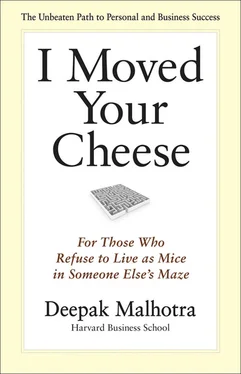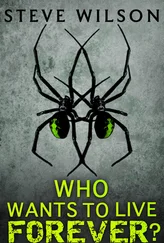Deepak Malhotra
I Moved Your Cheese
To Aria and Jai …
When a book has sold over twenty million copies, due respect for the opinion of its readers creates an obligation to explain why someone would seek to challenge its central message. I hope to do that, briefly, in these opening pages. The real answer, however, lies in the fable itself.
This book was written – and is meant to be read – as a stand-alone entity. Not surprisingly, however, I’ve been asked whether it was crafted as a rebuttal to Who Moved My Cheese? ( WMMC ), or as an extension of it. Or, to put it another way: Am I saying that the message of WMMC is incorrect, or simply incomplete? The answer is both.
For those who are having a hard time dealing with big (or even small) changes in life, WMMC is a compelling read. The book is a useful reminder that we need to accept that change happens, that it may be beyond our control, and that we need to find the strength to move on and adapt. This message is neither incorrect nor trivial. But it is incomplete. Even when adaptation appears to be the only viable option, we should do more than blindly accept – and eagerly adapt to – change. We should seek to understand why the change has been forced on us, how we might exert greater control over our lives in the future, whether the goals we are chasing are the correct ones, and what it would take to escape the kinds of mazes in which we are always subject to the designs of others. In other words, effective adaptation is not enough for success or happiness.
Then there are the ways in which the message of WMMC is not simply incomplete, but dangerous. Perhaps we should think twice before telling others that they would be wise to immediately embrace their limitations. Perhaps we should not suggest to would-be innovators, problem solvers, entrepreneurs, and leaders that instead of wasting their time wondering why things are the way they are, they should simply accept their world as given. Perhaps we should stop telling people that they are simply mice, chasing cheese, in someone else’s maze. I know those are not the messages WMMC set out to promote, but to many readers, they are powerfully conveyed.
I Moved Your Cheese aims to help readers question their assumptions about what limitations they really face and to encourage them to take the steps necessary to change not only their behavior but also their circumstances. In the face of long-standing precedent, strong social norms, resource scarcity, and the powerful expectations of others, individuals may underestimate their ability to control their own destiny, to reshape their environment, and to overcome the constraints they face. Success in areas such as career development, innovation, entrepreneurship, creativity, problem solving, and business growth – and also personal growth – often depends on exactly that: the ability to challenge assumptions, reshape the environment, and play by a different set of rules … your own.
Like WMMC , this book tells the story of mice who live in a maze. In this case, the main characters are three unique and adventurous mice: Max, Zed, and Big. As we watch their lives unfold and intersect, we discover that instead of just reacting to change and chasing the cheese, each of us has the ability to escape the maze or even reconfigure the maze to our liking. We can create the new circumstances and realities we want, but first we must discard the often deeply ingrained notion that we are nothing more than mice in someone else’s maze. As Zed explains, “You see, Max, the problem is not that the mouse is in the maze, but that the maze is in the mouse.”
Конец ознакомительного фрагмента.
Текст предоставлен ООО «ЛитРес».
Прочитайте эту книгу целиком, купив полную легальную версию на ЛитРес.
Безопасно оплатить книгу можно банковской картой Visa, MasterCard, Maestro, со счета мобильного телефона, с платежного терминала, в салоне МТС или Связной, через PayPal, WebMoney, Яндекс.Деньги, QIWI Кошелек, бонусными картами или другим удобным Вам способом.











